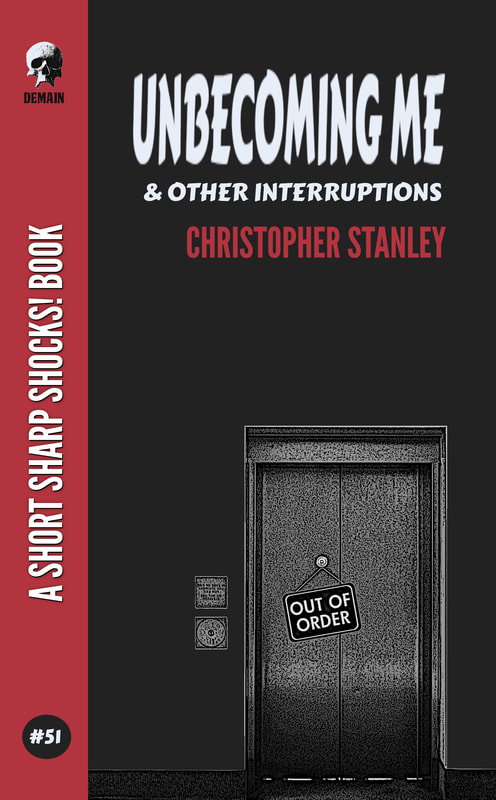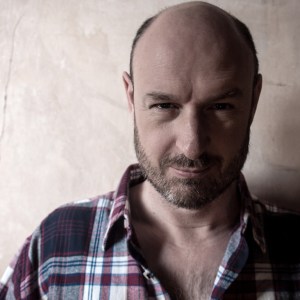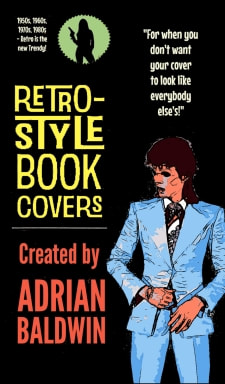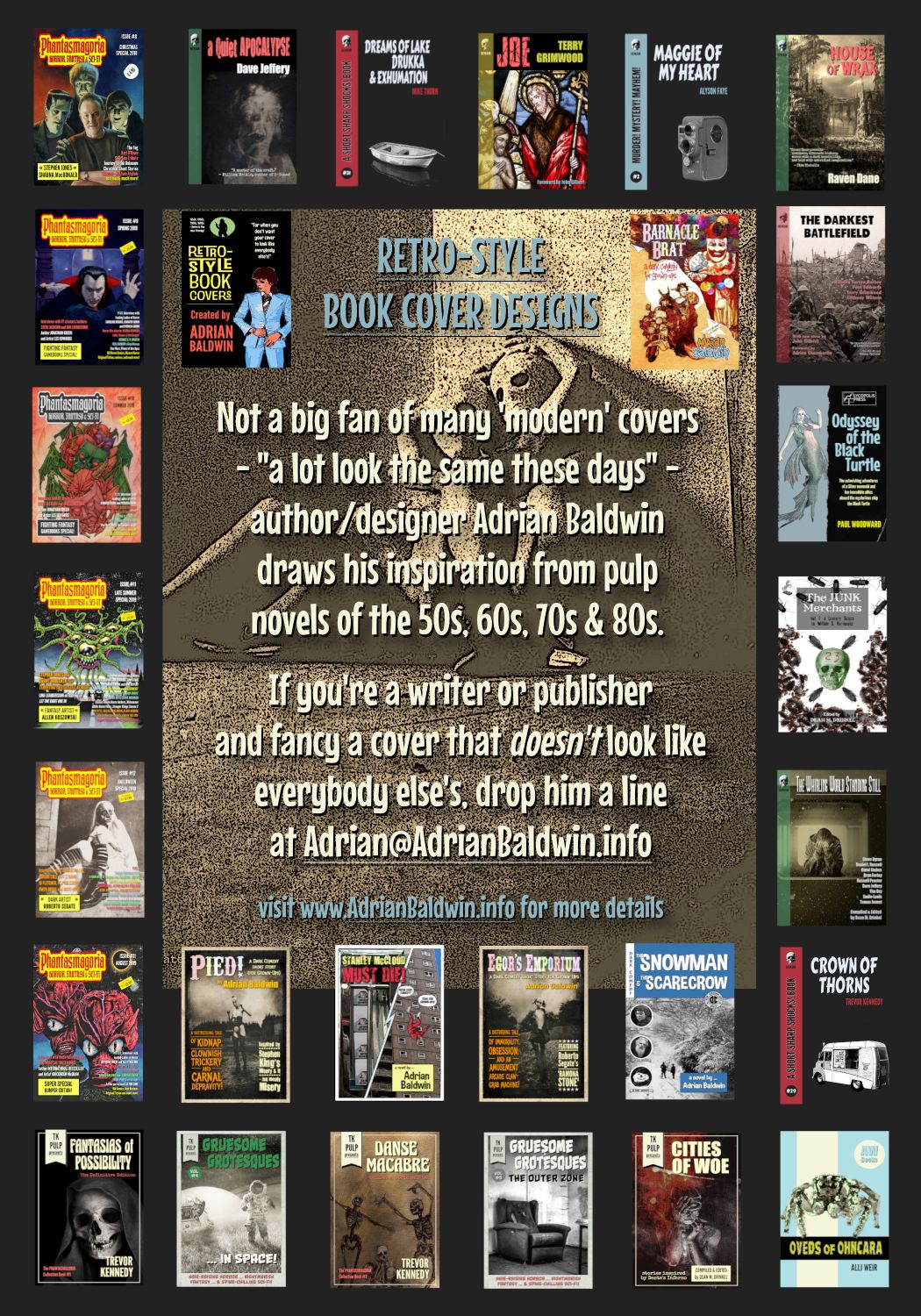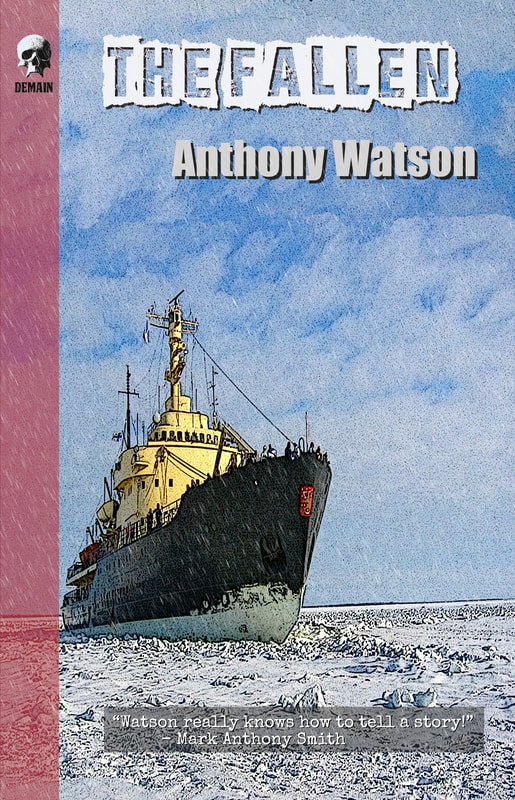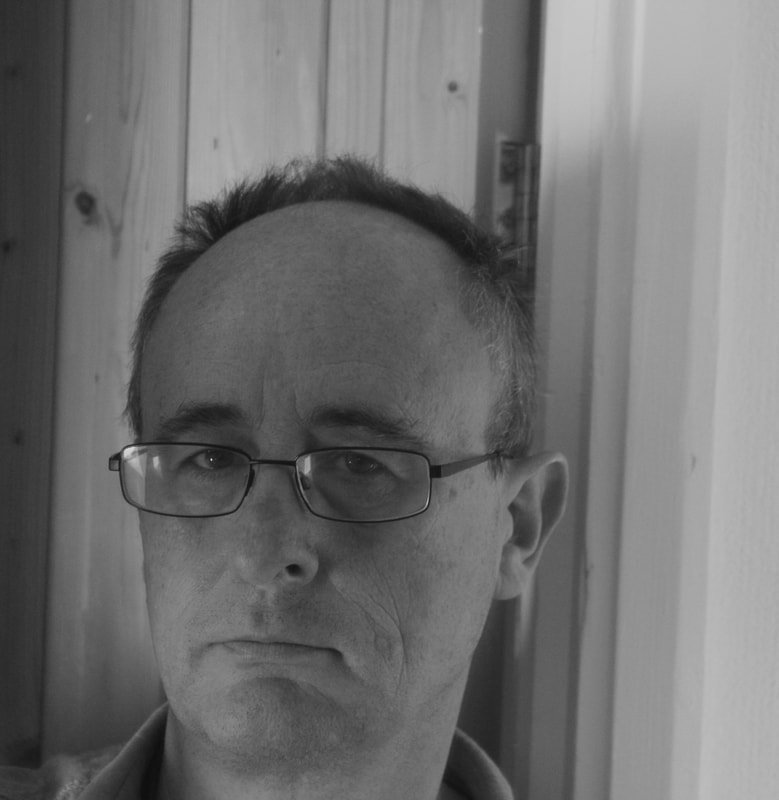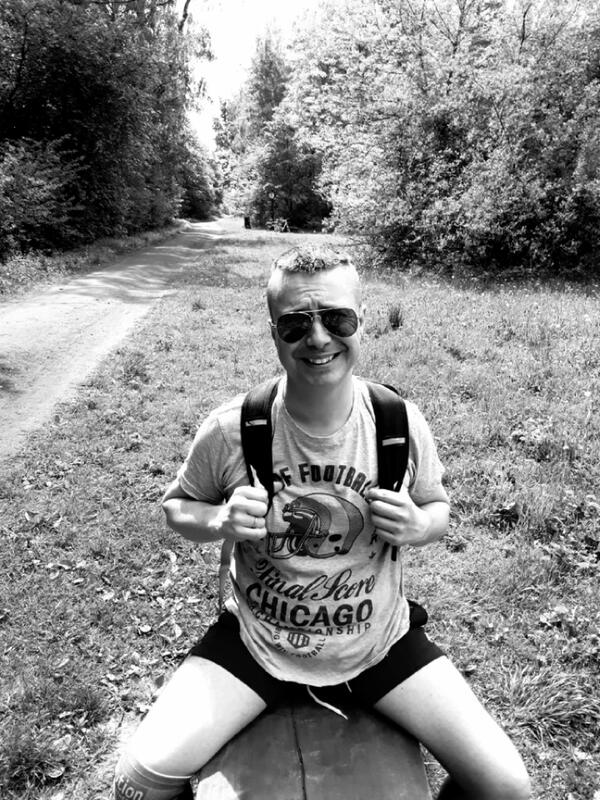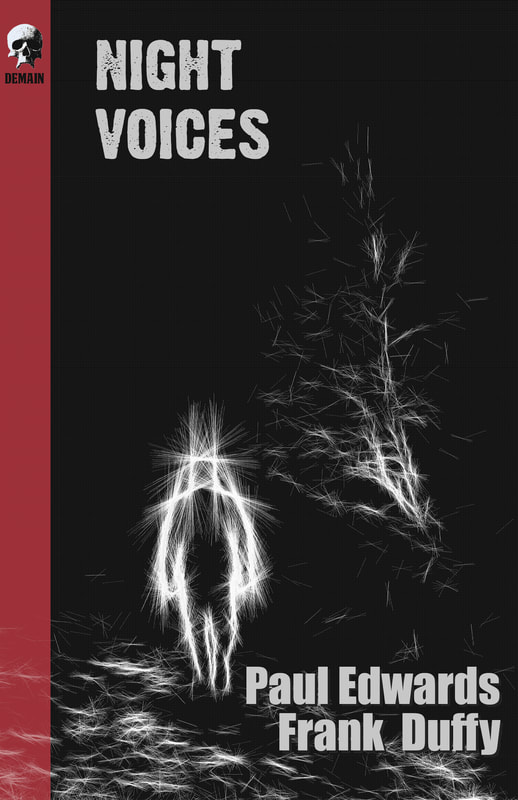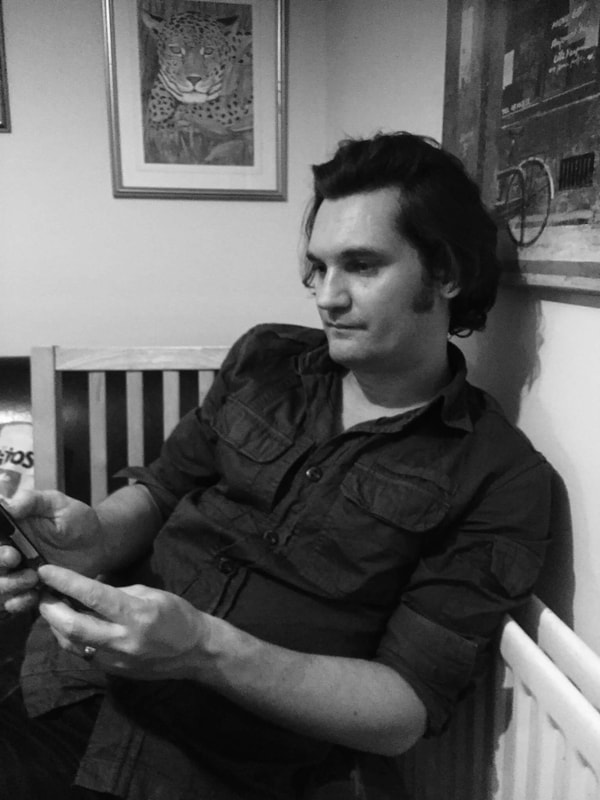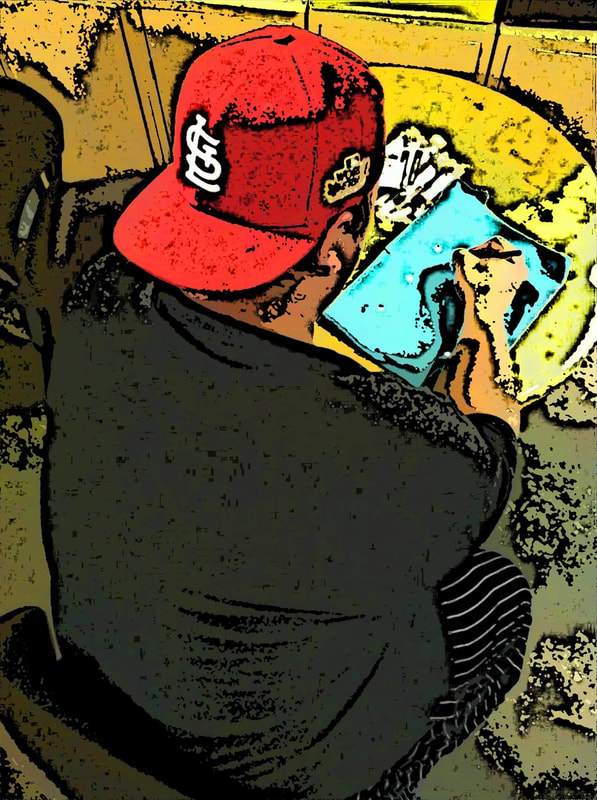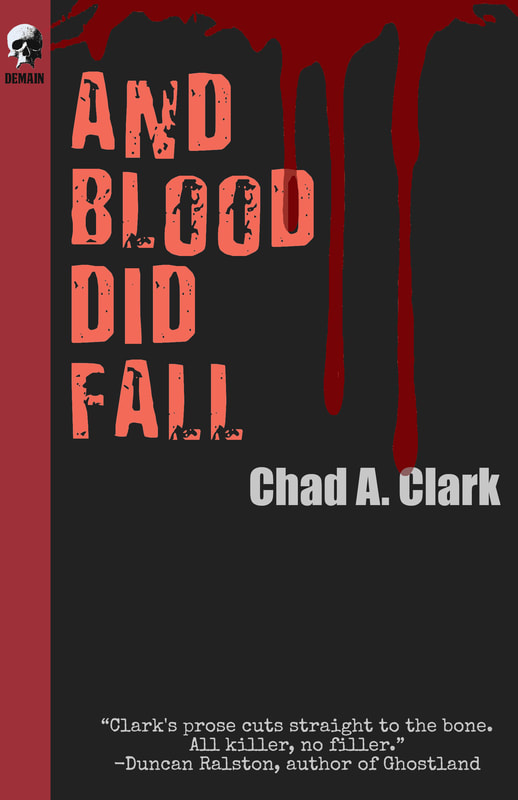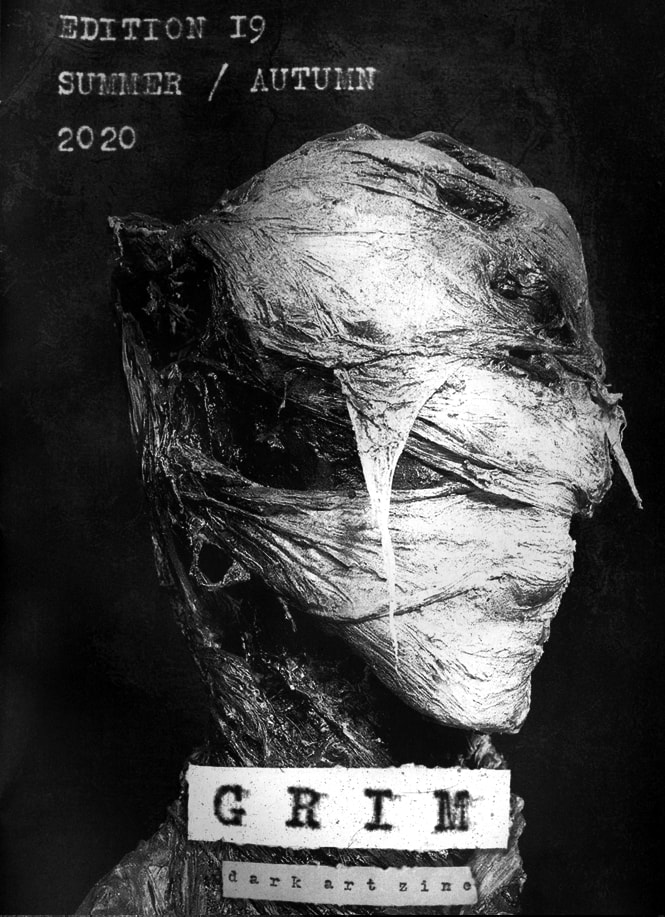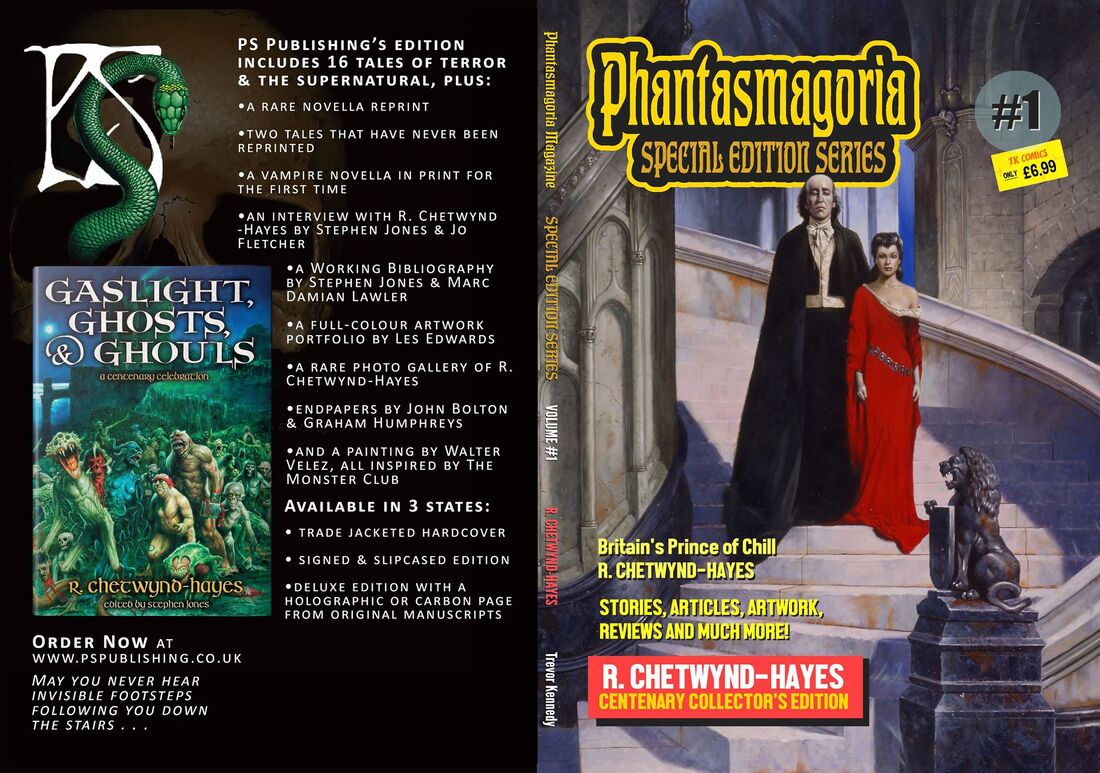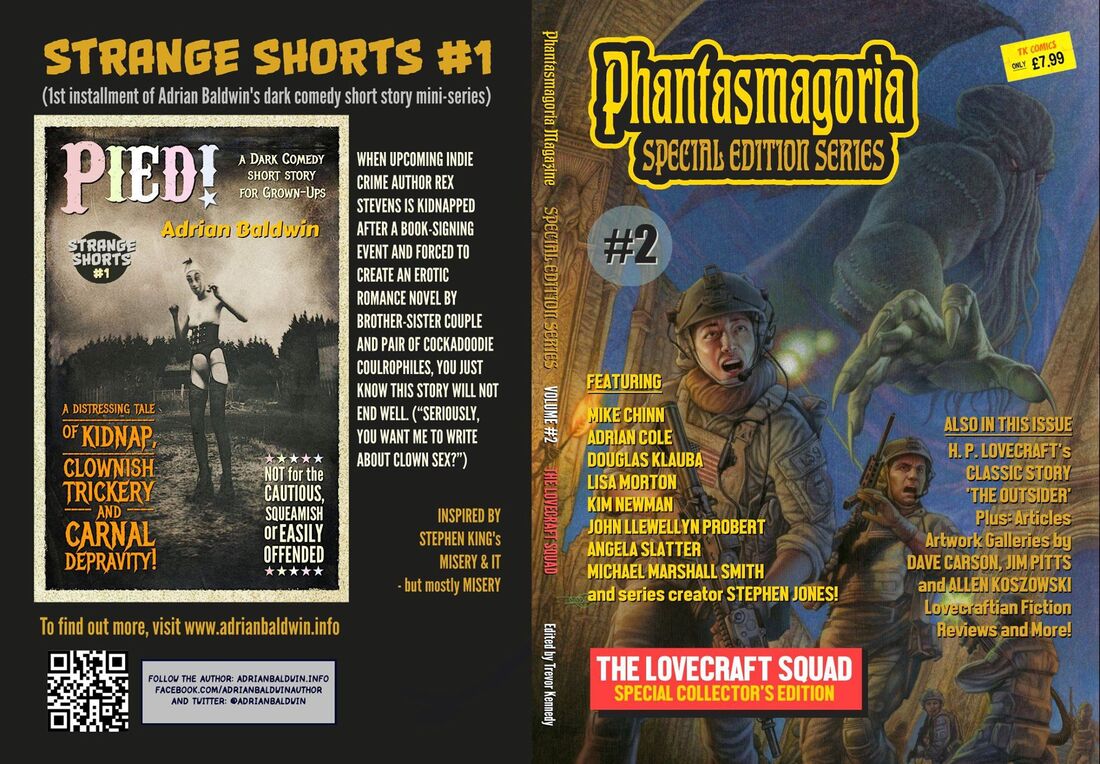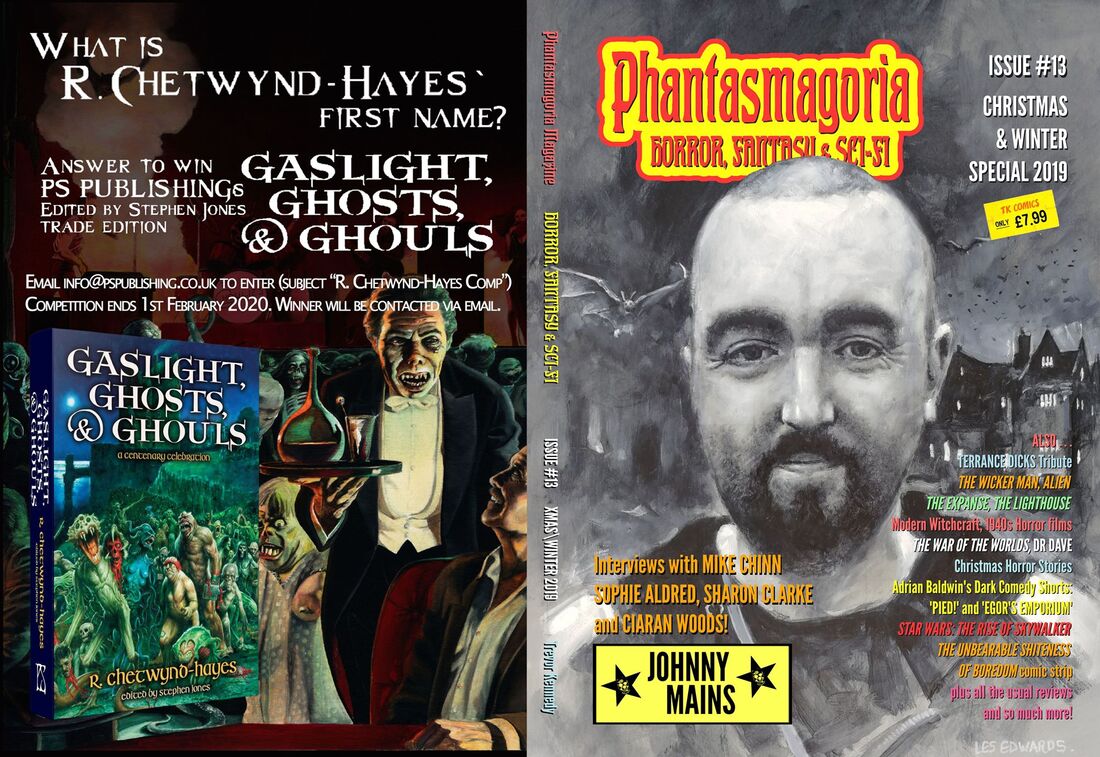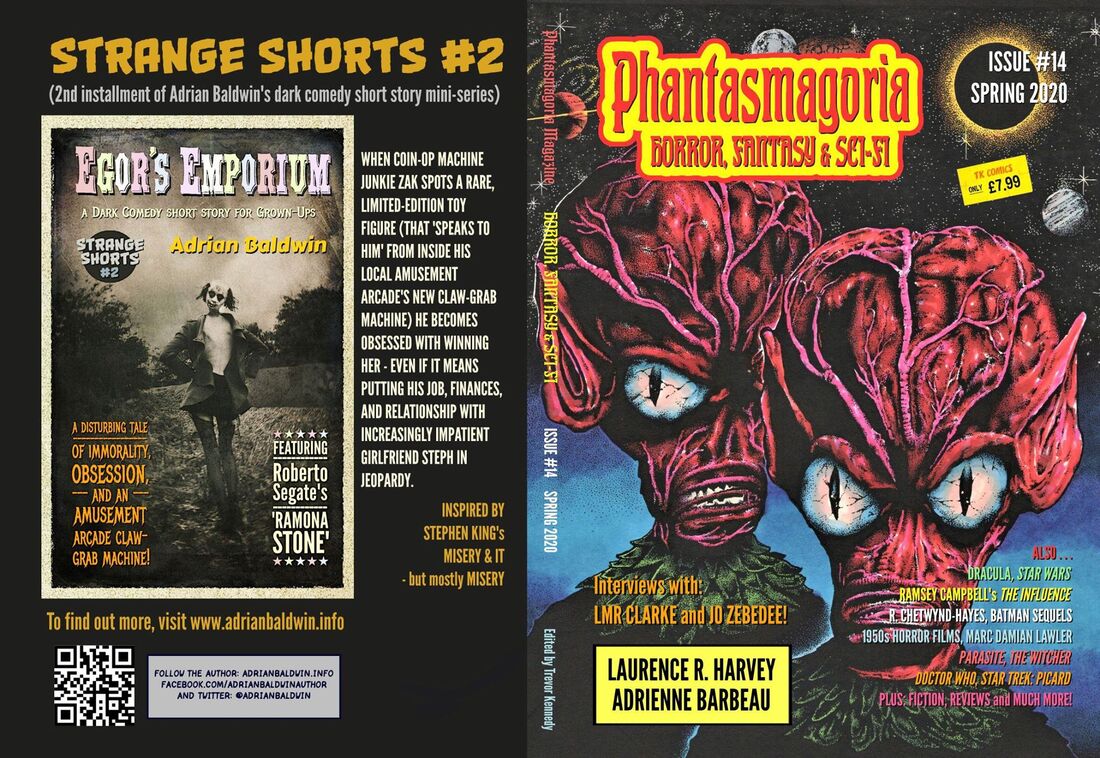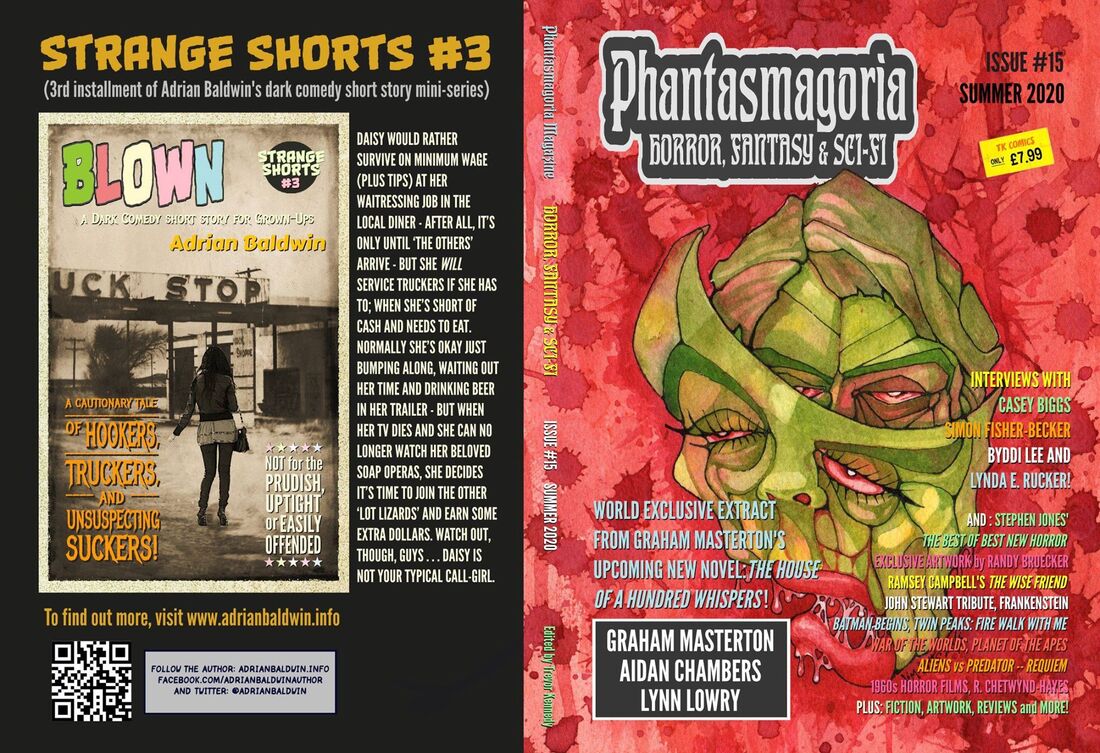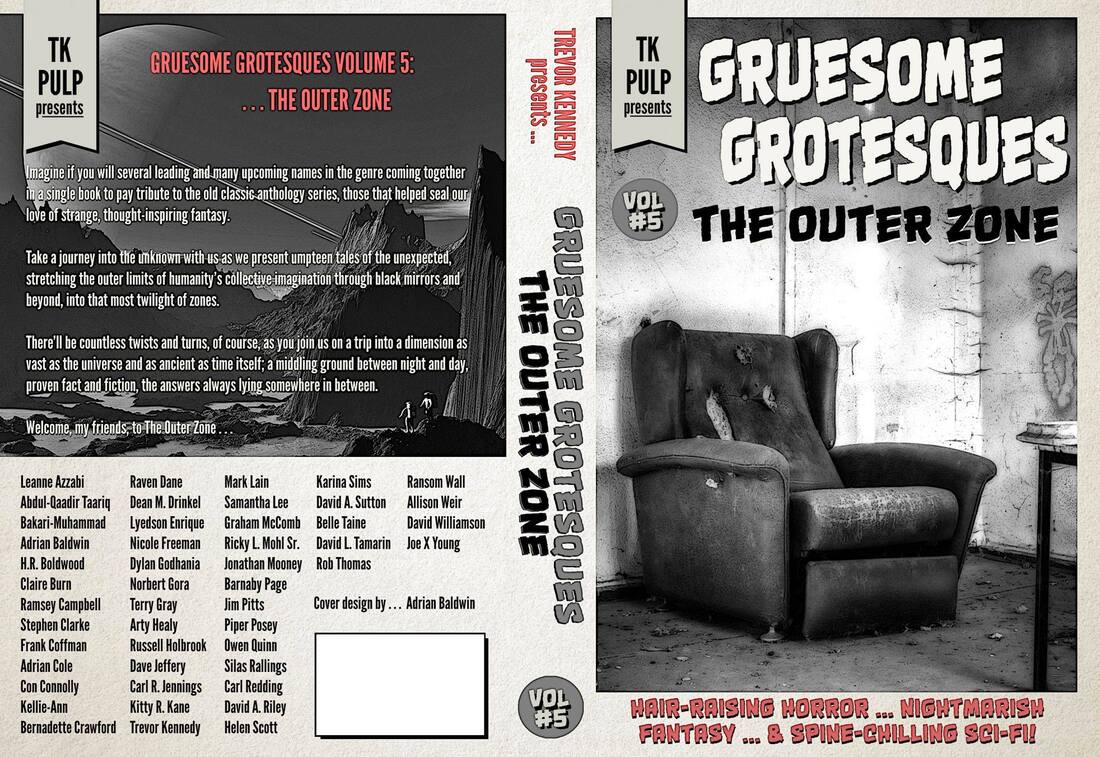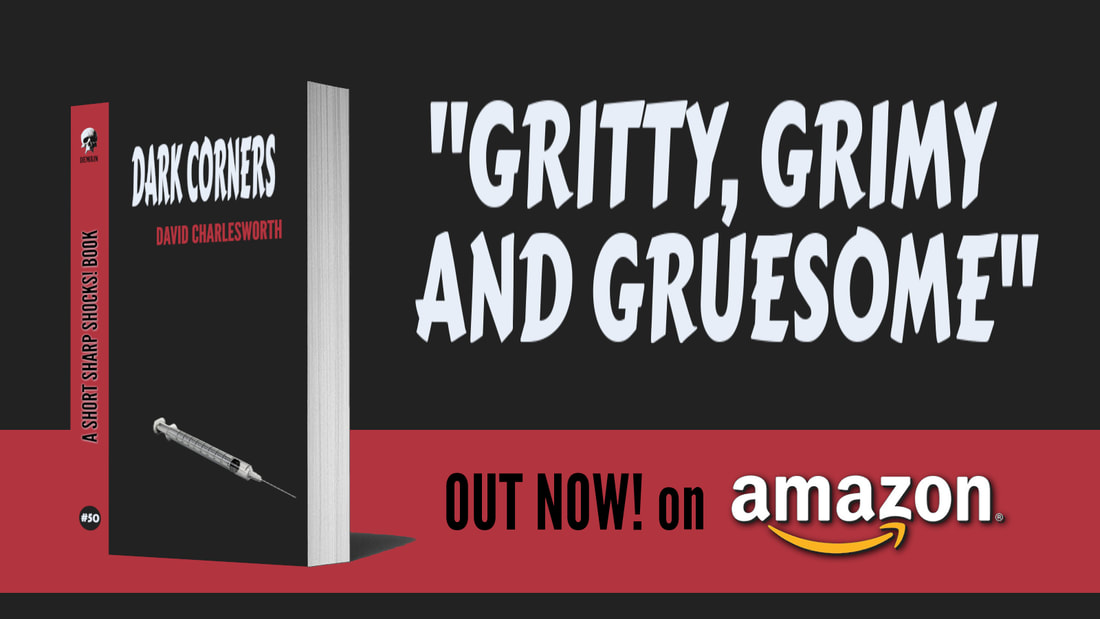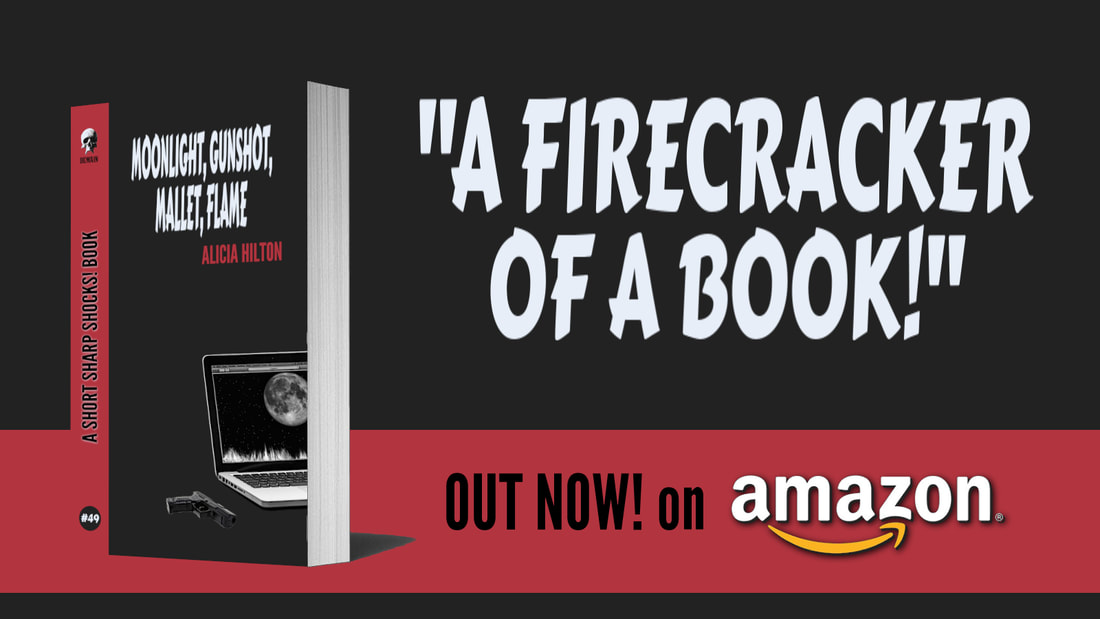|
|
|
We welcome back author Christopher Stanley (The Forest Is Hungry) to DEMAIN with his exciting new mini-collection Unbecoming Me And Other Interruption which is published as an ebook on the 18th September (but is now available for pre-sales). Cover, of course, by the brilliant Adrian Baldwin. As Lockdown was eased, Dean and Christopher sat down and talked about it.
DEMAIN PUBLISHING: Great to see you again Christopher! It’s a pleasure to work with you again, so, first things first can you tell us what was your first introduction to the horror genre? CHRISTOPHER STANLEY: And great to be here! I think my first introduction to horror was a collection of short stories I came across in my school library when I was 10 or 11 years old. I can barely remember anything about it now, other than a vague recollection of the cover, and that it contained a mix of ghost and monster stories. I felt differently about that book to the other things I was reading at the time. The stories were dangerous, unpredictable, and exciting. I’m sure that’s what sparked my interest. And that’s why libraries are so important – they’re a chance to browse and discover new things. DP: Ah, I know what you mean, when I was a kid I picked up a ghost annual (or something) by Daniel Farson so totally know where you’re coming from. So, your new Short Sharp Shocks!? CS: My latest contribution to the Short Sharp Shocks series starts in much the same way as my previous one—with a father running to save his daughter. That’s also where the plot similarities end. I tried to write my first SSS book, The Forest is Hungry, with the sensibilities of a thriller. It was supposed to be a page turner. The new book is different. It’s a collection of three short horror stories: Devil’s Reach, Hell’s Teeth and Unbecoming Me; all of which I’ve written with more focus on character. In Devil’s Reach, I channelled my inner-Ramsey Campbell by taking normal situations and playing with them to create a sense of creeping unease. Hell’s Teeth was supposed to be a flash fiction story, based on the premise of re-transacting with a classic fantasy figure. Subsequent drafts grew longer as the young girl at the heart of the story, having tasted victory, decided she wanted more. The title story, Unbecoming Me, is a coming-of-age tale with a couple of significant twists. Growing up is so damned hard at the best of times, and the narrator in Unbecoming Me was in for a shock (or two) as he tried to juggle university with his lifelong search for requited love. DP: We really loved the stories and the Ramsey Campbell ‘comparison’ is spot on. Personally I think Hell’s Teeth would make a cracking short film. In writing this collection, did you have to do much research? CS: I cheated with a couple of these stories. I often find myself researching locations when I’m writing—making special trips, scrutinising photos I’ve found online, and talking to people who know the areas better than I do. In this collection, Devil’s Reach is set on a ferry crossing I’ve made many times, while Unbecoming Me takes place at The University of Birmingham, where I read Economics (more years ago than I’d care to admit). The school in Hell’s Teeth isn’t based on an actual school—it’s a composite of schools I attended when I was growing up. DP: And did you find the collection particularly difficult to write? CS: Yeah, the stories in this collection were tricky, to say the least. Trying to make the characters authentic, while moving the plot forward at a sensible pace, growing the tension, and not neglecting the horror, is the literary equivalent of spinning plates. A lot of plates. Once you start setting scenes, hinting at subplots, and weaving in backstory, there are many things that can go wrong. I guess that’s the craft. That’s what we try to do. DP: Indeed we do. What would you say is your biggest success creatively to date? CS: Every Christmas, I reflect on the previous year and consider what I’ve achieved with my writing that I hadn’t done previously. Being relatively new to the writing scene, and having so far managed to avoid any kind of overnight success, it’s easy enough to plot a steady upward trajectory in my writing achievements—getting published, winning competitions, selling stories, being asked to write a blurb etc. It’s satisfying. Last year’s highlight was The Forest is Hungry--my first standalone publication. This year, I reached another career milestone with the publication of my flash horror collection, The Lamppost Huggers and Other Wretched Tales. That was an incredible experience. I’m really proud of the result, too, with cover art by Kealan Patrick Burke and an introduction by Sunday Times bestselling author Christina Dalcher. So yes, I guess that’s my biggest success to date. DP: Thoroughly deserved! What books / authors does Christopher Stanley read and are they an influence? CS: Over the past few years, I’ve read and loved a lot of books by a lot of different authors. Amongst the highlights have been a handful of Ellen Datlow anthologies, including two Best Horror of the Year anthologies, and her recent ghost story anthology, Echoes. I know Datlow’s tastes are a little literary for some, but each of the anthologies I read contained many more hits than misses. More importantly, for someone returning to horror after a prolonged absence, they introduced me to some incredible writers—Nathan Ballingrud, Gemma Files, Paul Tremblay, Robert Shearman, Carole Johnston, John Langan, Alison Littlewood, Rio Youers and Bracken MacLeod, to name a few. DP: Some cracking names there for sure. Um, okay, so what is Christopher Stanley scared of? CS: As a father, I spend at least twenty-four hours a day worrying about my kids—their health, safety and wellbeing, and the amount of time they spend playing computer games. I think that’s why children show up in so many of my stories. The father in Unbecoming Me, like the father in The Forest is Hungry, is motivated by a desire to save his child. There’s no point at which he’ll stop or give up—these cease to be options once you become a parent. DP: And finally, what is something your readers might be surprised to find out about you? CS: By some strange quirk of fate (let’s call it ‘marriage’), my father-in-law is Vincent Price. Not the Vincent Price, but I can pretend. Oh, that’s just brilliant. Well, Christopher the best of luck with your new Short Sharp Shocks! If you would like to connect with Christopher direct: Website: https://christopherstanleyauthor.com/ Twitter: @allthosestrings
0 Comments
Just a little reminder that all DEMAIN covers and branding is done by the brilliant brilliant brilliant Adrian Baldwin. Please check out his other work and recommend him where you can.
September 4th sees the publication of a brand new historical / horror novel called The Fallen by Anthony Watson which would make this his…third (!) release from DEMAIN (he previously contributed to The Darkest Battlefields anthology and series one of the Short Sharp Shocks! with Shattered). The novel is typical Watson fayre with a heady mix of horror and history…the brilliant cover is by Adrian Baldwin and recently they sat down and chewed the cud…
DEMAIN PUBLISHING: Great to work with you again Anthony. Okay, a blank slate: who are you and why did you become a writer? ANTHONY WATSON: Ha ha. Okay. Hi – I was born and bred in the north east of England, I now live in north Northumberland with my wife Judith and our two dogs. We’re pretty much out in the sticks which suits us both perfectly and can walk straight out the front door into woodland or, if we’re feeling more energetic, walk a mile or so to the beach. I worked in an NHS pathology lab for thirty five years before taking early retirement in February this year. My hand was forced by a re-organisation of the service in which I worked which meant I would either have to move or find another job in the hospital if I wanted to stay on, neither of which really appealed. Not going to work means I have more time to dedicate to writing which I’ve always enjoyed but took up seriously again about ten years ago. I’m not sure where the desire to write came from but I’ve always read a lot and so it’s probably a knock-on effect from that. I tend to live inside my own head a lot of the time and while I’m in there I’ll be thinking up ideas and plots. I write for my own pleasure (and to stop my head filling up with too much stuff) and would continue to so even if nothing else I wrote ever got published. That said, I’m still immensely proud if something I’ve written does get published (to say nothing of incredibly excited). DP: I totally get that ‘living in your own head’ thing. I’ve had a very productive Lockdown creatively and lots of Zoom meetings etc but I need to get out into the world now and actually interact with human beings again. That will be a little strange I think. So, The Fallen, tell us all about it… AW: The Fallen is set in three different time periods: present day, World War Two and 16th Century Russia. It’s set on and around the Arctic Ocean and the protagonists are the scientists onboard an Arctic research vessel, some merchant seamen in an Arctic convoy and a band of mercenaries seeking religious icons for Tzar Ivan the Terrible. All three groups encounter the same supernatural horror – a fallen angel – and the storylines are entwined with actions in one timeline having consequences in the others. DP: I’m not an expert by any means but I’ve been doing some reading recently about Ivan – a very interesting period of Russian history…did you have to do much research when writing The Fallen? AW: I did a ton of research - which I loved. It’s one of my favourite parts of the process to be honest; I love finding out stuff (far more than I ever did at school unfortunately) and find it hugely stimulating, often generating new ideas and plots as a result. Because a lot of The Fallen takes place in the past I did a load of research simply to get the details right – I think if you write something in a historical setting you have an obligation to do that, there’s nothing worse than having an anachronism which will take the reader out of the story [DP: we’re with you on that!]. For the Russian section I did a lot of digging into the life of Ivan the Terrible and especially his personal guards the Oprichniki - the organisation to which the main characters in this section belong. They used to dress completely in black and ride black horses with severed dogs’ heads attached to the saddles. The Arctic convoy section needed loads of research too, technical specifications for an oil tanker and just generally what life was like on board. I read HMS Ulysses and The Cruel Sea as part of that research. The modern day section led me into the world of submersibles and global warming and I now know a lot more about ice than I ever thought I needed to. A lot of what I learned I didn’t use (unlike Dan Simmons) but it was really useful to have in the background so to speak when I was writing. Some of it has found its way in but hopefully I’ve presented it in a way that merges with the text naturally and doesn’t feel like a massive info dump. DP: Honestly, I think you’ve got it spot on and those Oprichniki deserve a book of their own! Would you say (because you’re trying to tie together history, horror and some sci-fi elements) that you found the novel difficult to write? AW: I have to say that I didn’t! I love writing and, whilst I’ll, often paint myself into corners plot-wise I could never say that I find any part of the process difficult. Of the three sections, I probably found the modern day one the ‘hardest’ but that was only because of the way the plot unfolded, with the characters having to make rational assessments and judgements (about something which, on the face of it, is completely irrational) rather than simply responding to events which was more the case in the other two sections. DP: I found the whole thing very ‘filmic’ and on a pure personal level, it really worked – I could see a lot of the ‘movie’ unfolding before me so well done! Creatively Anthony what would you say was your biggest success so far? AW: Creatively what is your biggest success? It would have to be my first novel Witnesses. I have no idea how much of a success it was in terms of sales as the publisher unfortunately went out of business not long after it was published and I never made anything out of it but in terms of my own personal satisfaction I couldn’t be happier with it. I tried something a little different with the narrative style, jumping backwards and forwards between four different timelines and using different tenses and voices. Only one reviewer seemed to have any difficulty with it and the feedback I received was pretty positive so I’m glad I took the risk. DP: Yes, totally agree. I’ve only ever seen praise for Witnesses so again, a well done from us. Can you tell us a little about the authors / books who possibly influence you? AW: The majority of what I read is horror and I’ve been reading it for a long time so the fact that I’ve chosen it as the genre I want to write in shows there’s definitely been an influence! I’m spending a lot of time re-reading books I read when I was younger (it’s an age thing…) and am currently working my way through Robert R McCammon’s back catalogue and enjoying them just as much as, if not more than, the first time. The small presses are doing a marvellous job of keeping horror alive as a genre and there’s so much great talent out there to choose from. I’d like to think I have my own voice or style but I guess it’s inevitable that what I read will have some influence. I use the term ‘style’ loosely, I’m very aware that my writing tends more to the pulpy rather than the literary end of the spectrum. That said, I have just written (and submitted) an attempt at a literary short story and the only reason I gave it a shot was because among my re-reads I’m working my way through John Irving’s novels and there’s no doubt in my mind that if I hadn’t been exposing myself to such brilliant writing I would never have attempted it. DP: Do you know you’re the second writer in as many days who has mentioned McCammon – I enjoyed his work when I was a kid and want to read some more and John Irving! Haven’t read him in a couple of years but definitely love his World According To Garp – good luck with your literary short! So in terms of horror, what does that mean to you? AW: If we’re talking about the horror genre – as distinct from the emotion – then for me I prefer some kind of supernatural element to be involved. That’s not to say I don’t appreciate other forms it’s just that I find those stories that do include them to be more satisfying. To be honest, I’ve never really analysed why I enjoy horror and I’m inclined not to as too much analysis can sometimes spoil the thing under scrutiny. I read (and write) as a form of escape and horror can provide scenarios very different indeed to the humdrum of routine existence. DP: So with that in mind, what frightens you? AW: I have plenty real world concerns - the lurch to the right in politics, the destruction of the environment to name but two – but I’ve never felt confident enough to incorporate them into my writing. As I mentioned earlier, I lean toward the pulpier end of the spectrum and allegory and metaphor are something I need a bit more confidence to attempt. Within the horror genre, I’ve a bit of a thing for demons and stories of possession. I blame my Catholic upbringing. I’ve broached the subject a couple of times in my writing and of course the adversary in The Fallen is cut from that particular cloth too. DP: Oh ha ha – I’m totally with you. I’m a Protestant but went to Catholic public school (yeah, get me lol) for a while and I totally have Catholic guilt – I can’t shake it, even now. A lot of my work is quite ‘religious’ and though I moved away from it, I’m actually being drawn back in ha ha. I’m angry with God for some reason and to be honest I think he’s angry with me…anyway, creatively, what have you not yet achieved? AW: I think at heart I’m a frustrated film director. When I write, I’m basically watching a film I’ve directed and am writing down what I see. So yes, I would absolutely love to make a film – or have a film made of one of my stories. Because I write in (what I convince myself is) a cinematic style, I think a lot of my stuff lends itself to interpretation as a comic/graphic novel so that would be really cool too. DP: Well, as I’ve said previously I can totally see The Fallen as a movie – and I definitely want to move into comics / graphic novels…imagine all the DEMAIN titles as graphic novels…the Lockdown then, how did you handle it? AW: I wrote a novel during Lockdown! Just a short one, 63000 words, but I cranked it out in eleven weeks. I think it was probably a way of escaping what was going on, losing myself in another world. When I finished it, I felt bereft. I’d enjoyed spending my time in the world I’d created so much I think it made coming back to this changed reality – and the utter shambles of the government’s response - even harder. There is so much more I could add to that last statement by I won’t ha ha! Brilliant to talk again with you Anthony. The best of luck with The Fallen – I hope it is a massive success for you. Anthony’s website is: https://anthony-watson.blogspot.com/ Author Frank Duffy is no stranger to DEMAIN. Recently we published his ebook collection ‘Distant Frequencies’. His new joint collection ‘Night Voices’ (with Paul Edwards) is out on the 4th of September – it’s currently available for pre-sales…
DEMAIN PUBLISHING: Hi again Frank, hope you’re well since we last spoke. Let’s get straight down to it – in writing your stories in ‘Night Voices’ did you have to do much research? FRANK DUFFY: Hi! As a rule of thumb (for me) short fiction requires a degree of economy. Therefore, I like to keep research to a minimum. To be honest, I find that life experience often serves as the best research for short fiction. For example, my story, Missing Country, is me drawing on personal experience. I did that exact job, the location is real, and that school exists. I simply relied on memory. But more often than not, it’s my imagination going for a run and exercising its artistic license. DP: And working with Paul – can you explain that process? FD: I’ve always wanted to work with Paul (Edwards), and we’d even talked about doing something together long before ‘Night Voices’ came about, but it never panned out at the time. Then last year, I floated the idea of doing a joint author collection. Neither of us had done one before and although it’s hardly a new idea, neither is it particularly common in the genre [DP – you’re dead right and that was why DEMAIN picked the collection up]. The basic premise was that we’d write six stories apiece, keeping it relatively simple. There was no discussion about linking them, which I believe works in our favour. We’re both thematically and stylistically very different authors. Plus, it also offers the reader a bit of variety. Since I’ve always admired Paul’s work, I was very happy when he agreed to work alongside me. DP: What is ‘horror’ to Frank Duffy? FD: I try not to get bogged down in what constitutes horror and what doesn’t. So the question is a good one. Because while the fiction I write might not always be what traditionalists call horror, it would almost be impossible for me to describe it otherwise. My definition is very broad. And I find I’m most often more likely to read and be interested in people who share this view. Horror for me is in some ways tied into the existential. It permeates ordinary life. Horror is the realisation life has passed you by without realising it. Horror is living in the past. Horror is failure to learn from mistakes. Regret. Stagnancy. Bitterness. Waging a perpetual war of competition. For me, all of these things represent horror in some way . DP: That’s some great definitions Frank, I’m glad I asked that question – thank you. What frightens you then… FD: Since I was a kid, I’ve been deeply phobic about flying. For many years I often dreamed about being stuck on a plane, or even being tricked into flying on one. However, it has only ever found its way into one of my stories, The Regression. I started out writing it as a serious piece, but somehow an element of macabre humour crept in there, and changed its overall tone. I guess the humour helped alleviate some of the emotions I was feelings as I was writing it. DP: Ah, flying. Not my best subject so I’m going to quickly move on. The Lockdown – how you finding it? FD: Since I was last asked this question, life in Poland has returned to normal, all things considered. I’m not sure this is a good thing, but it at least offers a semblance of the ordinary. Of course, there some residual effects. Most people (at least here in Warsaw), myself included, still wear masks in public places, despite this no longer being a legal requirement. The irony being, it’s probably more disconcerting to see people not wearing them. But generally speaking, everything has gone back to the way things were pre-pandemic. DP: Ah, that’s great to hear. Finally then Frank, can you tell us something surprising about you? FD: I once broke International Maritime Law to get my beloved dog, Mr Mole, across the Channel. The story is much too long to relate now, but suffice to say, the story also involved 47 hours spent travelling across land with Disco Polo music blasting for the entirety of the journey. And believe it or not, my mother’s home was once thought to be genuinely haunted. Only, another irony, I never noticed a thing until many years later, which shows I’m about as sensitive to the paranormal as a lump of coal. A rather poor admission to make being a horror author… Ha ha ! A great place to finish. Thanks a million for your time again Frank, all the best with ‘Night Voices’. Paul Edwards has been part of the DEMAIN family for a couple of years now and contributed a brilliant story to the WW1 / horror anthology ‘The Darkest Battlefield’. When DEMAIN was approached about publishing his new collection (jointly with Frank Duffy) called ‘Night Voices’ (as an ebook on September 4th but currently available for pre-sales; cover by Adrian Baldwin) it was a no-brainer. Prior to publication, Dean and Paul sat down and talked.
DEMAIN PUBLISHING: Good to speak with you again Paul, hope you’re doing okay…for those that don’t know you, can you tell us a little about yourself and how you became a writer. PAUL EDWARDS: Hi! And yes, well, I am 44 years old and I live in the market town of Frome in Somerset with my wife, Mandy, and our two daughters, Lily aged 17, and Poppy aged 14. I’ve always had a drive to write; ever since I was a kid, I’ve loved writing my own scary stories! Being a lifelong horror fan, I’ve always written, read, and watched horror. It’s a genre that’s endlessly intrigued and fascinated me. DP: You and me both – I feel I’m learning something new about the genre every day. In terms of your stories… PE: My six stories were actually inspired by my day job as a Family Support Worker. Writing them felt cathartic – a way, I guess, of trying to make sense of some of the more difficult and challenging behaviours I’ve encountered through the job. After reading Frank’s tales, I was surprised by how (unintentionally) we’d touched on similar themes and ideas. I think the stories complement each other really well. DP: They really do and that’s why I / we thought the collection really works with two authors…did you find any of your stories particularly difficult to write? PE: I actually surprised myself by how quickly I wrote them! The ideas came fast and fully formed, and I wrote the first drafts in under a month. It’s the editing side I find most difficult – trying to hone and edit the work into reasonable shape can be a frustrating, exhausting process. I’ll reach a point where I’m absolutely sick of the work, and it’s then I know I need to put it away, to give myself a break. To come back another day and look at it through fresh eyes. But all that effort is worth it when someone likes your work enough to publish it. I get a big kick out of that. DP: I'm with you there! Paul, what was it like working with another writer – can you explain that particular process? PE: Working with Frank was great. He initially approached me with the idea of writing a joint collection. It was pretty daunting at first, having to write six new stories in a relatively short space of time. And I had to be strict with myself, fitting it around family life and the day job by setting writing goals and objectives for myself each day. We only read each other’s stories after we’d finished them, so there was no conferring! I’m a big admirer of Frank’s fiction, so it was an absolute honour and a pleasure to have collaborated with him. DP: Oh I bet. Perhaps ‘Night Voices’ might be the first in a series of joint collections – we’ll have to give that some serious thought ha ha! What would you say was your biggest creative success to date? PE: I would say my novella Where the Wounded Trees Wait, which was published by DEMAIN in ‘The Darkest Battlefield’ - an anthology of supernatural World War 1 novellas that I was massively proud and honoured to have been a part of. I approached that story in a different way too, as I actually spent time researching by visiting Mametz and other battlefields of the Somme, in order to try and get a sense of the place and history. It turned into a very humbling and moving experience all round. I was really proud of how that story turned out. DP: And rightly so, having also visited those battlefields your story brought back a lot of memories. Who do you read and are they an influence? PE: As a horror fanatic, I do tend to read mainly horror fiction. Some of my favourite authors include Ramsey Campbell, Joel Lane, Jack Ketchum, Poppy Z. Brite, Gary A. Braunbeck, Stephen King, Thomas Ligotti, Clark Ashton Smith and Robert Bloch, to name but a few. My favourite writers inspire me to pick up my pen and write straight after I’ve finished reading them. I’m particularly drawn to cosmic horror – I love the original ‘Tales of the Cthulhu Mythos’ anthology edited by August Derleth; it’s a book I’ve returned to again and again. One of the stories, Return of the Lloigor by Colin Wilson, inspired a novel that I’ve started, which mixes cosmic horror with my own experiences as a Police Community Support Officer! DP: Oh, I’d love to read that! What is Paul Edwards frightened of? PE: I guess I’m afraid of losing my mind…of losing my identity. Of losing touch with reality in general. These are things that truly scare and unsettle me. Also, the thought of losing my family; the people that are closest to me. I’m pretty sure these fears get worked into my stories all the time. I think, as a horror writer, it is vital to draw on your own fears for inspiration. To make the horror real, I guess. DP: Dead right. Thinking about your creativity, is there something you haven’t yet done? PE: 1) I’ve always wanted to finish a novel, so completing the first draft of one this year felt like a big achievement. I wrote it longhand in my car during lunch-breaks at work. There’s still tonnes of work left to do on it, though…fingers crossed I’ll see it published someday… 2) I’ve always wanted to write my own Choose Your Own Adventure book, as I was a HUGE fan of CYOA, Fighting Fantasy, etc. in the 80s. I still have most of my old gamebooks, which I nostalgically return to from time to time. My favourite gamebook is House of Hell by Steve Jackson, which definitely helped to nurture my love of all things horror. I have actually started writing my own CYOA book, and have plotted and planned most of it out already. It’s set in Northern France, with a fair bit of local mythology and folklore involved. DP: Oh my lord! House Of Hell! I remember that…and doing your own, Northern France – seems a winner to me already – we might have to talk about that in the future ha ha. So, we’re apparently coming to the end of the Lockdown – how was it for you? PE: I’ve handled lockdown pretty well. I’ve loved spending more time with my family. I’ve been keeping in touch with friends and extended family members through Zoom, and even managed to run a ‘Call of Cthulhu’ RPG campaign with my dad and brothers via video conference, which was a lot of fun and not something I would have done under normal circumstances! I’ve also found a lot more time to write, and as a result I’m close to finishing another collection, which I hope to submit somewhere in the not too distant future… That’s brilliant – thanks a lot for your time Paul, it was great connecting with you again. Truly the best of luck with Night Voices! If you’d like to connect with Paul direct: Website Address: https://pauledwardshorror.blogspot.com/ Insta: https://www.instagram.com/infernal__love/ September 4th also sees the publication of Chad A. Clark’s horror novella And Blood Did Fall as an ebook (with a cover by Adrian Baldwin). Towards the end of Lockdown, Dean and Chad talked about it.
DEMAIN PUBLISHING: Welcome Chad, nice to meet you. For those that aren’t aware of you or your work can you tell us a little about yourself? CHAD A. CLARK: Hi, of course. I’ve always been a passionate reader. I was reading fully on my own before I even started school so that has always been a strong suit. Add to that an early love of film and I suppose it was a natural progression for me to move on to my own storytelling. As to what drew me to horror specifically, I don’t know if that’s something I can track as well. It was just what I felt naturally drawn to and I think if I try to analyze it more than that it would be indulging in too much pop psychology. Let’s just say that these are the clothes that have always been the most comfortable on me. DP: I like it – and can you please give us some specifics about your novella… CAC: I had really wanted for some time to tell a really gritty noir sort of story. Up until now the exact shape of that never really felt right to me. I also had a notion of bringing back a monster that I had used previously in a blog, sort of part vampire, part body thief. Somehow, those two notions ended up dovetailing. The story is set around a detective who professionally, is kind of at the end of her rope. She ended up a police officer after an injury ended her naval career before it really got started. She finds herself now beating her head up against multiple walls, gaining the respect of her male co-workers while at the same time trying to make a difference in a city landscape that just seems to drown in crime. She isn’t in a happy place when the story starts and I tried to sketch a landscape that would reflect that. DP: We really loved your protagonist by the way! In writing And Blood Did Fall, did you have to do much in the way of research? CAC: I don’t bring a ton of technical detail to my writing. I’m just not that kind of artist. I love guys like Tom Clancy but that kind of writing is just around the bend from my abilities. My stories tend to focus on the characters and the immediate experiences of those characters. I think my roots in flash fiction puts me in a mindset where I try to cook the story down to the essential elements. As such, beyond some occasional details I need, I don’t find myself immersing myself in research. DP: So you didn’t find it hard to write? CAC: There are always aspects of every book that I struggle with. This originally was a five part short story that I expanded into a full length novella so it was a challenge to get it properly expanded. I had some feedback from an early version that the story was a little too straight forward so I had the challenge of coming up with a completely new subplot and weaving it into the main narrative. There were chapters that had me banging my head on the table but I’m a firm believer in forcing through those harder moments and just like other projects, everything began to click with this one as well. DP: I do like the ‘shortness’ of several scenes / passages so to see that it originally started life as a short story fits that pattern – cool. Creatively Chad what would you say is your biggest success (so far obviously). CAC: I suppose the moment I am most proud of creatively was in having a short story selected to be included in a tribute to the late, great George Romero, titled ‘Stories of the Dead’. I wrote a story that functions as a sort of theoretical bridge between Day of the Dead and Land of the Dead. Being able to play in that narrative world as well as having the chance to pay tribute to such a creative luminary was an incredible honor for me. DP: Oh, I bet. I’m not sure if you’ve seen it but I love George’s take on Stephen King’s The Dark Half – very influential…talking of which who influences you? CAC: Ha ha - Stephen King would be the easy answer to that question! He’s the one author I have read for most of my life and was the subject of my one non-fiction title, Tracing The Trails, in which I read and reviewed all of his books in order of publication. I would be kidding myself if I tried to deny that his style hasn’t affected my work. Growing up, in terms of horror, Anne Rice and Robert McCammon were two regulars I read quite a bit of. At an early age, I was a huge fan of John Bellairs and his work was probably some of my gentle introductions to the horror genre. Outside of horror, growing up in the nineties it was hard to avoid the elephants in the room that were John Grisham and Michael Crichton. I was also a pretty big Tom Clancy fan. And finally, in terms of indie and small press horror, I’m a huge fan of Rich Hawkins and Duncan Ralston. Also loving work from Thomas Flowers, Laura Mauro, the Sisters Of Slaughter and Patrick Loveland, just to name a few. I’m always on the lookout for a new pen to watch. DP: Some great great names there! What would you say is a great definition of ‘horror’? CAC: Horror is a few things to me and it isn’t necessarily about feeling horrified as the reader or the viewer. It sounds illogical and I see often repeated sentiments along the lines of, “That’s not horror. It didn’t scare me at all.” And while I can certainly understand the sentiment, I think that sets up too arbitrary of a standard by which to define the genre. What scares you and me and anyone else is likely to be totally different so I don’t think you can really say that horror is only what scares me. For me, horror is about the narrative immediacy of plunging a character or a group of characters into a truly horrific situation. And while you might not feel the pitter-patter of your own heartbeat you should at least recognize how dire your situation would be if that was you on the page. Horror for me is about the characters and the visceral experience you get from sitting on that character’s shoulders. Finally, I think that horror is something that engages you on a moral level. Many argue that horror glorifies violence but for me it’s more about rocking you in your beliefs and perspectives and forcing you to hold steady under the weight. It’s about digging into your own morality and exploring the darker sides of your emotional reactions. Horror is about challenging you on all levels. And then letting you walk away, safe and sound. DP: That’s a wonderful definition, I’ll make a note of that – thanks Chad. Is there any horror book or film you’re looking forward to? CAC: Having kids, I don’t really keep up with films and I’m not always on top of upcoming releases. As far as books go I am interested in Josh Malarman’s followup to Bird Box. But I find I’m more about paying attention to authors. Rich Hawkins and Duncan Ralston are two that I keep an eye out for new books and obviously I’m always up for grabbing the latest from Stephen King. On the film side of things I am actually pretty excited for the upcoming adaptation of The Stand on CBS’s streaming platform. DP: The Stand…how very apt for right now! But you’re right, that should be a fun one…what scares Chad A. Clark? CAC: It’s funny, just the other day I was thinking about how often I see people on Facebook asking for recommendations for horror books that will “really scare them”. My brain just doesn’t work that way. I wish I could get so immersed in a book that it actually makes me feel fear but it’s pretty rare. In terms of movies, paranormal content has probably reached me the most consistently and a lot of my writing reflects that. I do tend to the claustrophobic side and I definitely dipped into that fear for a few chapters of my novella, The Child At The End Of Time. And of course from an early age I’ve been fascinated by great monsters and for sure I brought that love to bear on this story. DP: Oh you did for sure. Creatively Chad is there anything you’d like to do that you haven’t done yet? If so – what is it? CAC: I would really like to be involved in writing a comic book. Comics were a huge part of my childhood growing up and I think my narrative sensibilities would be well suited for the medium. I also don’t really know how that process works and the more opportunities I have to learn, all the better. Now whether that experience would be in an already formed comic universe, I don’t know. But I think it would be a special thrill to see a story of mine accompanied by some great artwork. DP: Definitely, I’m actually speaking to some comic book artists at the moment about a couple of projects – I have to admit, I’d love to see all the DEMAIN titles as comic books…food for thought there. Okay, so the Lockdown – how are you handling it? CAC: Lockdown has been rough to be sure. We haven’t seen most of our family in months and have been contesting with the stress of home schooling on top of everything else. Everyone is healthy, thankfully but we live in a scary part of a scary country right now. In terms of work, I’ve actually been doing a ton of editing for my publishing imprint, Darker Worlds Publishing. It’s only been recently that I’ve started having time to work on my own stuff. I get up around twelve-thirty (AM) and go to work. I’m home after that and don’t leave until the next time I go to work. Save for grocery trips, we stay at home. Life with COVID is day to day and we find ourselves constantly having to recalibrate. Luckily for me I have a great family around me and together we have been holding up really well. DP: I’m glad everybody is healthy and that you’ve been able to get some work done. It’s certainly been something I never thought I’d see in my life-time…finally Chad, can you tell your readers something which might surprise them? CAC: There is a tiny possibility - and when I say tiny I mean TINY - a tiny chance that I could be related to Shirley Jackson. It has to do with a General during the American Revolution that our two families might have a connection with. Our relation to the General has not been substantiated and I doubt that I’m actually related to her but considering the path I have gone down, it is fun to think about. It certainly is! Chad thanks for your time, it is very much appreciated. Best of luck with And Blood Did Fall. If you would like to connect with Chad direct: Website: www.cclarkfiction.net Facebook: https://m.facebook.com/cclarkfiction Twitter: @ChadClarkWrites. Roberto Segate provided the main image for Dave Jeffery's A Quiet Apocalypse which DEMAIN will always be grateful for. Roberto is an acclaimed dark artist and is also responsible for the Grim 'Zine - issue 19 is currently available (which includes a short story by Dean) with Issue 20 coming in the Fall.
Roberto's website is: https://www.roberto-segate.co.uk/ And more details about Grim 19: https://www.roberto-segate.co.uk/product/grim-19-dark-art-zine-summer-autumn-2020/ Trevor is very much part of the DEMAIN family (particularly with his SSS! entry, Crown Of Thorns) - he's also an editor / compiler / publisher in his own right. Here are some examples of his recent work (covers by Adrian Baldwin) which are well worth checking out (of which Dean has contributed various stories / articles). The titles are available in various branches of Forbidden Planet but also on Amazon (search: Gruesome Grotesques or Phantasmagoria). Well done Trevor, Adrian and the TK Pulp team(s).
|
CategoriesArchives
July 2024
AuthorDean M. Drinkel |
